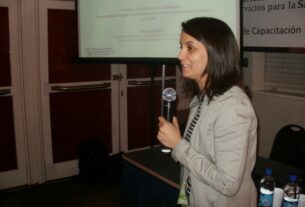At the start of 2009, a space was created on Twitter dedicated to the
exchange of information among users interested in eHealth. It attracts both doctors and patients in search of answers to various different ailments or concerns.
So the hashtag #hcsm (Health Care and Social Media) was born, led by
Dana M. Lewis, who still moderates the American version of the virtual chat
room. This initiative led to the creation of different regional channels including the European (hcsmeu) and Latin American (hscmla) versions. Patricio
Petracca, an international HIS and HIE consultant who works at the Argentinian Ministry of Health, is an active member of the latter.
“We meet around once a week to share our opinions and experiences on
three previously agreed themes. As in any conversation, the number of
participants varies according to the different rooms, the level of interest in
the theme proposed, the energy of the moderator and also the day, but we are
motivated to keep the space going because it enriches everyone by introducing
us to new points of view and allows us to freely express our ideas about
eHealth and the different projects that arise (even though we are limited to
140 characters),” said Petracca.
With the open communications standard and P2P – peer to peer sharing – technology,
the Latin American version was set up by doctor Valentina Jaramillo
(the founder), with the support of Boris Groisman and Omar Andrade.
The objective? To offer the opportunity to chat about healthcare with
other interested Latin American Twitter users, who can now exchange information
on common problems in the Region at a dedicated #hcsm chat room.
#hcsmla was begun in October 2010 with Patricio joining in May 2011,
after being contacted by Valentina on Linkedin.
The hashtag’s growth was unprecedented and today with more than 100
followers it has become one of the most promising Health 2.0 initiatives in
Spanish.
“The response on Twitter shows that the space is necessary,” stated
Petracca, explaining: “We are trying to make it more of a space for e-patients,
rather than colleagues. Their participation is important in changing the
doctor-patient relationship. We need to transform the paradigm of the doctor
being a doctor and the patient being a patient. Because often the doctor is a
patient too and when they are in this situation they better understand the
other person’s point of view and might then be able to establish more assertive
relationships with their patients.”
What does it mean to be an e-patient?
Anyone who thinks that the term describes the possibility of a person
replacing a doctor-patient relationship with social networks through which they
will be able to access treatments and get healthy, should know that, although
this might be possible in the future, the hcsmla community is not there to
promote these ideas.
The ‘e’ placed in front of the word ‘patient’ indicates a participative
patient who uses social networks, portals and other electronic means and also refers
to their empowerment. The fact that today patients arrive at doctors’ surgeries
having already carried out research on the internet, either through a search
engine or through conversations on social networks, does not threaten the
authority of a doctor or put their role in healthcare at risk.
To the contrary, Petracca says that an empowered patient is a doctor’s
ally, someone who will participate in their own treatment, play an active role
in their recovery and the search for answers and who may also be able to help
other patients with similar ailments.
It is true that this change also requires an adjustment from doctors who
must now be ready to answer new questions from their patients, many of which
will be relevant whilst others will betray significant levels of confusion and
disinformation. “What we want is for doctors to play the role of guides for
their patients. There is a lot of information available on the internet and a
patient can’t tell the difference between what is correct and what is not. But
the truth is that social media can favour a healthcare model which encourages
education and prevention. Healthcare is founded on education and prevention and
this can be achieved by providing patients with good quality content,”
concludes Petracca.
How to join
To join the #hcsmla conversation you just need a Twitter account. The conversations
are held every Tuesday at the following times in each country:
Argentina 20:00 UTC -3h
Bolivia 19:00 UTC -4h
Chile 20:00 UTC -3h
Colombia 18:00 UTC -5h
Ecuador 18:00 UTC -5h
México 17:00 UTC -6h
Paraguay 20:00 UTC -3h
Perú 18:00 UTC -5h
Uruguay 21:00 UTC -2h
Venezuela 18:30 UTC -4:30h
España 24:00 UTC +1h
More information is available at hcsmla.com and also by following @hcsmla

